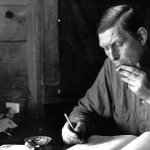and ourselves with fear; not that it would do anything
to us, mind you—our hopes were much too high for that—
but there was always that remote, unacknowledged possibility
that we had thrown one stone too many, by the handful,
and that by some force of nature, as they called it,
it might rain and rain for days, as it had been,
with nothing to hold it and the structure back,
and with everything to blame, including children
on into late summer and all the years ahead,
when it would be ours to bear, to do much more with
than remember and let it go at that—some mud,
some driftwood, some space of sky as a reminder
before getting on with the world again;
no, the balance was ours to share, and responsibility
for rivers had as much to do with anything
as rain on the roof and sweet fish for supper,
as forests and trembling and berries at sunrise;
thus it was, then, that we kept our watch,
that we kept our wits about us and all the respect
we could muster, sitting in silence,
sleeping in shifts, and when the fire died,
everyone was there to keep it alive;
somehow, though, in the middle of the night,
despite our vigils, our dreams, our admonitions,
our structure, our people, and all our belongings
broke free with a shudder and went drifting away—
past the landing, the swing, the anchored cages,
down through the haunted rapids, never to be found;
when we awoke that morning, the sun was back,
the river had receded under our measuring stick,
and everything had been astonishingly replaced,
including people and pets, the structure intact,
but in the solitude of all our faces as we ate,
the knowledge was there, of what we all had done,
and that everything would never be the same.





















Comment form: